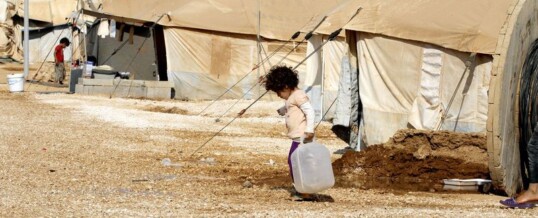
McLeod Group Blog, December 21, 2015
Like a bunch of month-old puppies, the media are all over the Syrian refugee story, unsure whether to focus on missed deadlines or new ski jackets for kiddies getting off the plane. There isn’t much talk, however, about those left behind: the 4.3 million Syrians in Turkey, Jordan and Lebanon, and the hundreds of thousands of Afghans, Somalis, Iraqis, Eritreans, West Africans and Asians trying to make it across the Aegean Sea and the Mediterranean.
Of the 650,000 Syrian refugees in Jordan, 80% are crowded into flimsy tents in settings that are no more than slums. The security, food, water and sanitation conditions are atrocious. The situation is no better for those in Lebanon and Turkey. More than half of the refugees are under the age of 18.
The daily horror faced by these people has been drowned out by stories of the lucky ones coming to Canada or those already in Europe, by news of the terrorist attacks in Paris and San Bernardino, and by the callous stupidity of Donald Trump.
In truth, most of the refugees, Syrian and otherwise, will never leave the region. Their only real hope is for an end to the political and economic crises that have driven them from their homes. This is where the world’s major effort must be placed. Sadly, the recent Security Council resolution notwithstanding, that is not happening.
Until it does, the plight of the refugees and displaced people in the Middle East needs far more attention than it is getting. One place to start is with UNRWA, the UN agency supporting more than five million Palestinian refugees. Canada, once a lead funder, cut off all support in 2012.
The UN’s global appeal for the wider Syrian crisis during 2015, minimalist at best, has been only 52% funded. This means that feeding programs have been curtailed or stopped and as winter arrives, malnourishment is setting in.
So far this year, as of December 16, Canada had contributed or committed US $173 million to humanitarian aid for the Syrian crisis, more than Japan, but on a per capita basis considerably less than Netherlands, Denmark and Norway. We can and should do better. And so should individual Canadians. In September, the Harper government said that it would match up to $100 million donated by Canadians for emergency assistance for refugees in the region. The deadline was December 31 and the new government has honoured the pledge.
So far, however, the response has been poor. The Canadian Red Cross has raised about $7 million, and the Canadian Humanitarian Coalition, which includes CARE, Oxfam Canada, Oxfam Quebec, Save the Children and Plan, has raised only $2.5 million in three months. That compares pretty badly with the $8 million it raised in six weeks for the Nepal earthquake in April.
The choice cannot be between the commendable business of bringing refugees to Canada on the one hand, and on the other, helping those who remain. But that seems to be what is happening, with Canada favouring the former.
Canadians need to do more to assist refugees and displaced people in the region. The government can help by extending the December 31 deadline. It can improve the matching ratio to encourage more donations: make it two-to-one or three-to-one, or even six-to-one. For individuals, it isn’t hard to make a contribution to the Red Cross or to the Humanitarian Coalition. The Word Food Programme has created a smartphone app that allows people to make very small ‘share the meal’ donations.
And the Canadian media needs to return to the wider refugee story—to the tens of millions of people worldwide driven from their homes by persecution, conflict and lack of opportunity.
